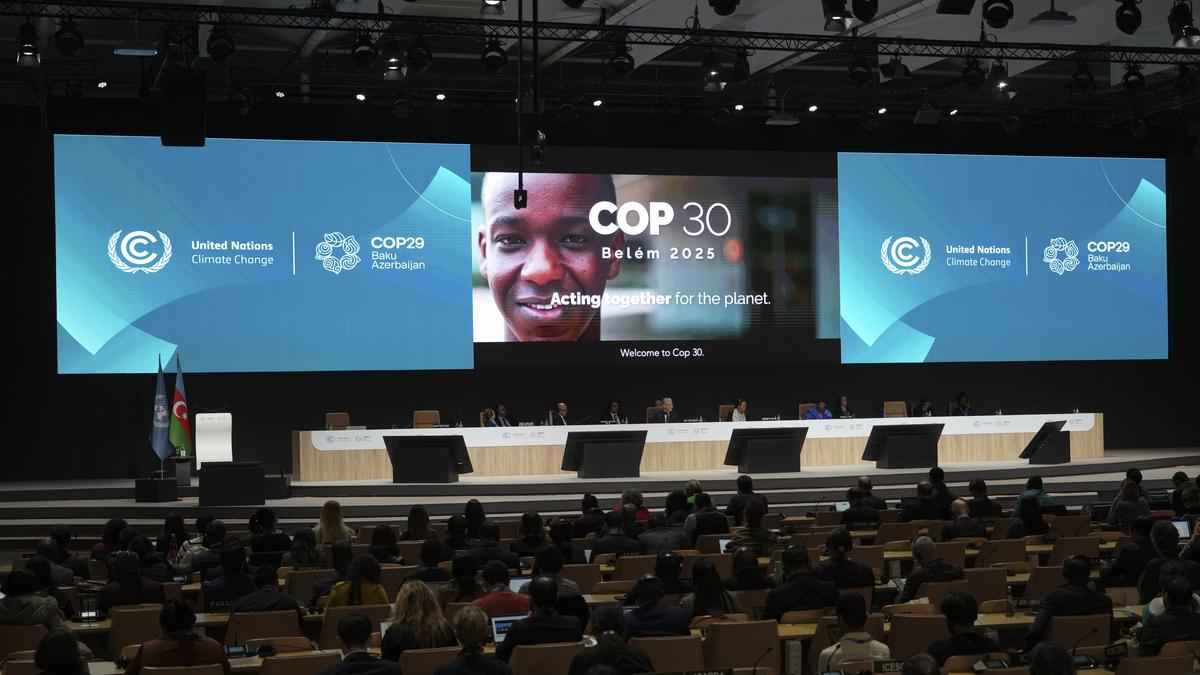Rethinking ‘Representation’ for a Meaningful COP30 (GS Paper 2, Polity)

Context:
- To achieve meaningful outcomes in future climate change conferences, the key lies in honest representation, actionable commitments, and transparency of intentions.
- The slow progress observed in previous COP29 negotiations has prompted a critical rethinking of how climate discussions are structured, especially considering the challenges in reconciling political, economic, and social interests.
- As Brazil prepares to host COP30 in Belém in 2025, it offers an opportunity to reshape the concept of ‘representation’ in climate negotiations for more effective and inclusive actions.
Introduction:
- Frustration over the slow pace of COP29 negotiations in Baku is not new.
- The politics of climate change and natural forces often seem misaligned, compounded by the absence of a unified global authority capable of addressing this urgent issue.
- There is no world government acting on behalf of the planet, and no universal metric system can reconcile the diverse political and economic interests of nation-states.
- The critiques of COP29 ranged from it being a disappointment to a failure, reflecting the inadequacies of the current model.
- As we approach COP30 in Belém, a rethinking of representation is essential for future success.
Pioneering Methodology by Bruno Latour and Laurence Tubiana:
- Bruno Latour, a prominent sociologist, and Laurence Tubiana, France's Climate Change Ambassador, pioneered a new approach to representation in the climate negotiation process.
- In May 2015, ahead of COP21 in Paris, they hosted a public event called the ‘Theatre of Negotiations’.
- This innovative exercise, held at Nanterre-Amandiers, involved 200 students from 143 universities worldwide, role-playing and simulating climate negotiations.
- This experiment centered around rethinking representation in climate negotiations, allowing participants to move beyond the traditional structures of power and diplomacy.
- The goal was to break from conventional methods and foster a more inclusive and creative framework for addressing global climate issues.
Sally Rooney’s Perspective on Representation:
- In exploring new methods for representation, Irish author Sally Rooney raises a compelling question about environmental devastation and its lack of representation.
- She writes, "When American colonists famously rebelled against the practice of **‘taxation without representation,’ how is environmental devastation without representation any different?"
- This critique highlights the moral paradox of countries in the Global North contributing disproportionately to environmental damage, while those in the Global South bear the brunt of the consequences, despite having no voice in the political systems that drive such damage.
Granting Equal Rights to Humans and Non-Humans:
- The methodology developed by Latour and Tubiana called for a radical shift in representation, where both humans and non-humans (such as the atmosphere, oceans, and soil) were granted equal rights.
- This meant recognizing the agency of non-human entities in negotiations, allowing them to have a voice in the discussions that affect them.
- This approach challenges the traditional authority of science and nature, treating these entities as active participants in the negotiation process rather than passive subjects.
Shift from Conventional Authority:
- Unlike traditional COP meetings, where scientific data and nature’s limits often dominate, this framework envisioned a more democratic and inclusive process.
- The goal was to simulate a truly representative process, allowing alternative perspectives and creative approaches to emerge in the negotiations.
- Delegates were encouraged to dramatisize and reframe issues, exploring new spatial-temporal perspectives to highlight the interdependence of ecosystems and nations.
Examples of Novel Interactions:
In this role-play scenario, new interactions were explored:
- The ‘Ocean’ imposed conditions on the ‘United States’, highlighting the environmental impact of its actions.
- The ‘Atmosphere’ directly addressed China, calling for stronger action on greenhouse gas emissions. These creative role-playing moments forced participants to reconsider the boundaries of sovereignty and the shared responsibilities of nations, reframing the discourse around territorial and environmental issues.
Representation by Diverse Delegations:
- The event also emphasized the importance of diverse delegations representing various sectors, including state and non-state actors, scientists, business leaders, and civil society representatives.
- This ensured a broad and holistic representation of the global climate challenge, including voices from vulnerable groups such as indigenous communities, rural and coastal populations, and others often left out of the decision-making process.
Insights from the Simulation:
The ‘Theatre of Negotiations’ exercise provided key insights:
- For delegates, it underscored the importance of communication in representing territorial concerns and values.
- For organizers, it highlighted the logistical and resource mobilization challenges involved in managing such a process.
- For students, it revealed alternative pathways to advancing the climate agenda, pointing out the limitations of the existing negotiation frameworks.
Representation of Non-Humans in Global Governance:
- A recurring debate in global governance is the representation of non-humans.
- While the legal frameworks in some countries (e.g., India, Ecuador, New Zealand, Canada) have granted legal standing to non-human entities, the global governance system has yet to fully adopt such principles.
- This raises questions about whether we can extend moral and legal agency to non-human entities like the Amazon, or if the anthropocentric approach will continue to dominate.
Conclusion: Transparency and Action:
- For COP30 to achieve meaningful outcomes, it must embrace honest representation, actionable commitments, and transparency of intentions. Contradictions such as hosting COP in countries heavily reliant on fossil fuels undermine trust and progress.
- If COP30 in Belém is to be truly impactful, it must consider representing the Amazon itself, symbolizing a shift toward inclusive, action-oriented negotiations that bridge the gap between ambition and action.
- This approach would ensure that global policies align with the values that we collectively champion, preventing us from sleepwalking through the Anthropocene.


